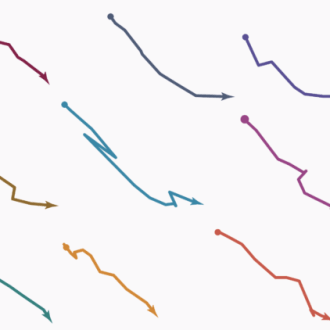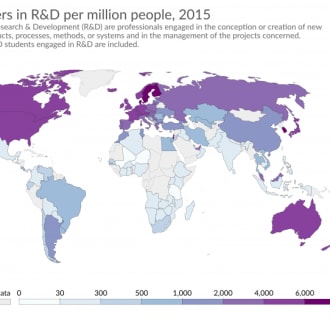The Best of Our World in Data
20+ most popular Our World in Data articles, as voted by our community.
Our World in Data on Artificial Intelligence
Artificial Intelligence
AI is already having a large impact on our world. Explore research and data to understand the trajectory of this important technology.
Artificial intelligence is transforming our world — it is on all of us to make sure that…
How AI gets built is currently decided by a small group of technologists. As this technology is transforming our lives, it should be in all of our interest to become informed and engaged.
Our World in Data on Data Visualization
Marriages and Divorces
How is the institution of marriage changing? What percentage of marriages end in divorce? Explore global data on marriages and divorces.
Our World in Data on Deforestation
Global deforestation peaked in the 1980s. Can we bring it to an end?
There was a marked acceleration in deforestation in the 20th century. But, global deforestation peaked in the 1980s. Since then, it has slowed.
Do rich countries import deforestation from overseas?
Rich countries import foods produced on deforested land in the tropics. How much deforestation do they import?
Our World in Data on Depression
Depression is complicated – this is how our understanding of the condition has evolved over time
Depression is the most common mental health condition. What do we know about its symptoms, severity and how these are measured?
Our World in Data on Environment
Wild mammals have declined by 85% since the rise of humans, but there is a possible future…
Wild mammal biomass has declined by 85% since the rise of humans. But we can turn things around by reducing the amount of land we use for agriculture.
Cutting down forests: what are the drivers of deforestation?
Three-quarters of deforestation is driven by agriculture. Most comes from the production of beef, palm oil, soy and logging industries.
Our World in Data on Poverty
The history of the end of poverty has just begun
The decline of global poverty is one of the most important achievements in history, but the end of poverty is still very far away.
Extreme poverty: how far have we come, how far do we still have to go?
Despite making immense progress against extreme poverty, it is still the reality for every tenth person in the world.
Our World in Data on Renewable Energy
The world’s energy problem: Without cheap, safe, low-carbon energy sources at scale we are stuck between the…
The world faces two energy problems: most of our energy production still produces greenhouse gas emissions, and hundreds of millions lack access to energy entirely.
What are the safest sources of energy?
Based on safety and carbon emissions, fossil fuels are the dirtiest and most dangerous, while nuclear and modern renewable energy sources are vastly safer and cleaner.
Our World in Data on Statistics
The limits of our personal experience and the value of statistics
The world is huge; to get a clear idea of what our world is like, we have to rely on carefully collected, well documented statistics.
Our World in Data on World
The Future is Vast: Longtermism’s perspective on humanity’s past, present, and future
If we manage to avoid a large catastrophe, we are living at the early beginnings of human history
Talent is everywhere, opportunity is not. We are all losing out because of this.
The world needs ideas and innovation to make progress against the many problems we face. Creative and talented people that can contribute to this important work are everywhere, but the opportunity to…
Popular
These are some all-time favorites with Refind users.
Coronavirus Disease (COVID-19): Statistics and Research
Coronavirus Disease (COVID-19) is a new global problem. This is our overview of the early research and data on the outbreak. We will extend this page in the days ahead.
Why did renewables become so cheap so fast? And what can we do to use this global…
Fossil fuels dominate the global power supply because until very recently electricity from fossil fuels was far cheaper than electricity from renewables. This has dramatically changed within the last…
Nuclear weapons: Why reducing the risk of nuclear war should be a key concern of our generation
The consequences of nuclear war would be devastating. Much more should – and can – be done to reduce the risk that humanity will ever fight such a war.
Coronavirus (COVID-19) Vaccinations
Tracking COVID-19 vaccination rates is crucial to understand the scale of protection against the virus, and how this is distributed across the global population.
You want to reduce the carbon footprint of your food? Focus on what you eat, not whether…
‘Eat local’ is a common recommendation to reduce the carbon footprint of your diet. But transport tends to account for a small share of greenhouse gas emissions. How does the impact of what you eat…
What is Refind?
Every day Refind picks the most relevant links from around the web for you. is one of more than 10k sources we monitor.
How does Refind curate?
It’s a mix of human and algorithmic curation, following a number of steps:
- We monitor 10k+ sources and 1k+ thought leaders on hundreds of topics—publications, blogs, news sites, newsletters, Substack, Medium, Twitter, etc.
- In addition, our users save links from around the web using our Save buttons and our extensions.
- Our algorithm processes 100k+ new links every day and uses external signals to find the most relevant ones, focusing on timeless pieces.
- Our community of active users gets the most relevant links every day, tailored to their interests. They provide feedback via implicit and explicit signals: open, read, listen, share, mark as read, read later, «More/less like this», etc.
- Our algorithm uses these internal signals to refine the selection.
- In addition, we have expert curators who manually curate niche topics.
The result: lists of the best and most useful articles on hundreds of topics.
How does Refind detect «timeless» pieces?
We focus on pieces with long shelf-lives—not news. We determine «timelessness» via a number of metrics, for example, the consumption pattern of links over time.
How many sources does Refind monitor?
We monitor 10k+ content sources on hundreds of topics—publications, blogs, news sites, newsletters, Substack, Medium, Twitter, etc.
Can I submit a link?
Indirectly, by using Refind and saving links from outside (e.g., via our extensions).
How can I report a problem?
When you’re logged-in, you can flag any link via the «More» (...) menu. You can also report problems via email to hello@refind.com
Who uses Refind?
450k+ smart people start their day with Refind. To learn something new. To get inspired. To move forward. Our apps have a 4.9/5 rating.
Is Refind free?
Yes, it’s free!
How can I sign up?
Head over to our homepage and sign up by email or with your Twitter or Google account.



















